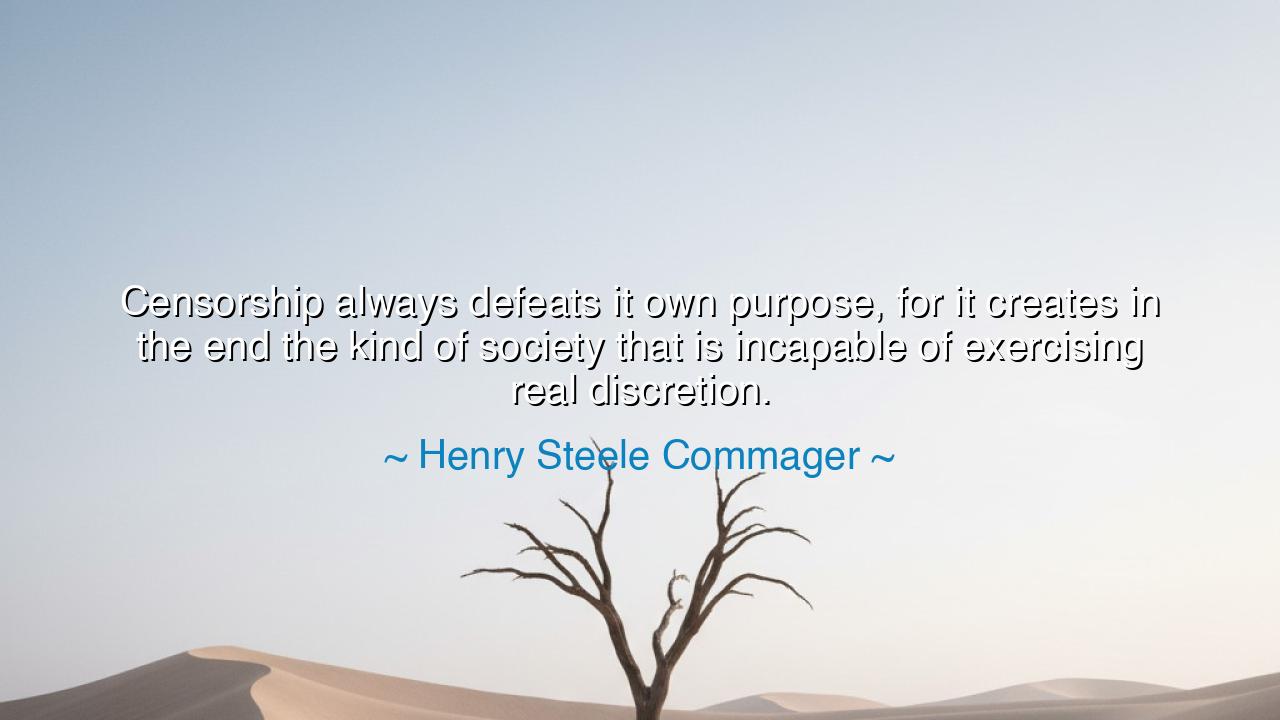
Censorship always defeats it own purpose, for it creates in the
Censorship always defeats it own purpose, for it creates in the end the kind of society that is incapable of exercising real discretion.






"Censorship always defeats its own purpose, for it creates in the end the kind of society that is incapable of exercising real discretion." These profound words by Henry Steele Commager strike to the very heart of freedom and expression, reminding us of the dangerous consequences of censorship in any society. Censorship—the act of suppressing or controlling what can and cannot be said or shared—often arises from the fear of dangerous ideas or uncomfortable truths. But, as Commager warns, this suppression does not merely silence voices; it erodes the very foundations of a free society, leaving it unable to make the discriminations and choices that are essential to its own health and progress.
In the ancient world, the role of free speech was closely tied to the flourishing of democracy and wisdom. Athens, the birthplace of Western democracy, understood the power of open dialogue, of debate and questioning. Socrates famously stood before the Athenian court, defending his right to question the status quo and to seek truth without fear. Even though his ideas were seen as a threat by the leaders of Athens, he insisted that a society that shuts down inquiry and criticism is a society doomed to stagnation. His trial and subsequent execution remind us of the perils of censorship—the suppressing of truth and the freedom to speak it, even at the expense of personal freedom.
Censorship, however, is not only the silencing of voices through force or law. It is also the subtle erosion of a society's ability to discriminate between truth and falsehood, between wisdom and ignorance. When speech is suppressed, when certain ideas or perspectives are silenced, society is deprived of the tools needed to make informed decisions. Commager's words remind us that censorship, rather than protecting society, leaves it vulnerable to blindness. A people who are not permitted to hear the full spectrum of ideas, to challenge the narratives they are given, are less capable of making choices rooted in reason and wisdom. They become like children, unable to discern the truth for themselves, dependent on others to decide what is worthy of thought.
The book burnings that took place during the Third Reich in Nazi Germany serve as a stark example of the power of censorship. The Nazis, in their attempt to control the minds of the people, sought to destroy works of literature, philosophy, and art that did not conform to their worldview. The burning of books was not just an attack on literature; it was an attack on the freedom of thought itself. The very act of censorship set in motion a society where people were too fearful to question, too obedient to think freely. It led to a blind adherence to a corrupt ideology that ultimately resulted in the loss of countless lives. In the end, censorship created the kind of society that was unable to recognize truth when it stared them in the face, leaving them vulnerable to the rise of tyranny.
This historical example reveals the dangerous cycle that censorship creates. Commager’s insight is not just theoretical—it is a warning that the suppression of speech does not prevent the spread of harmful ideas; rather, it empowers them. When ideas are suppressed, they do not vanish—they fester in the shadows, growing stronger and more difficult to address. The true power of free speech lies in the ability to expose falsehoods and lies through open dialogue, to test ideas against the light of truth and reason. In this way, a society becomes stronger, more capable of recognizing the good and rejecting the bad. Censorship, by contrast, keeps dangerous ideas in the dark, making it harder to engage with them and to defeat them.
The lesson that Commager imparts is timeless: the suppression of speech undermines the moral and intellectual foundation of a society. If we, as individuals, are not free to express ourselves, to challenge ideas, and to engage in open debate, we lose the very ability to exercise discretion. Discretion, the ability to distinguish between good and evil, between wisdom and ignorance, is essential for a healthy society. If we remove the means by which individuals can make informed decisions, we risk creating a society where truth and justice are no longer upheld, where conformity takes precedence over diverse thought.
Therefore, let us take up Commager’s wisdom and protect the freedom of speech at all costs. Let us be vigilant against censorship, understanding that when we silence voices, we also silence the discretion that allows us to build a more just, free, and rational society. It is not enough to protect speech that is comfortable or agreeable; we must embrace speech that challenges us, that makes us uncomfortable, and that forces us to confront the truth. In doing so, we will create a society that is truly capable of exercising the wisdom and discretion necessary to navigate the complexities of the human experience.






AAdministratorAdministrator
Welcome, honored guests. Please leave a comment, we will respond soon